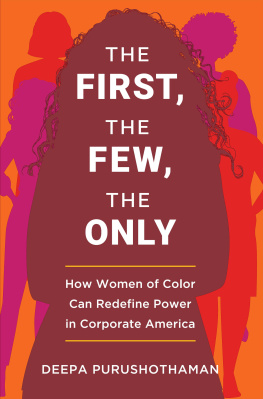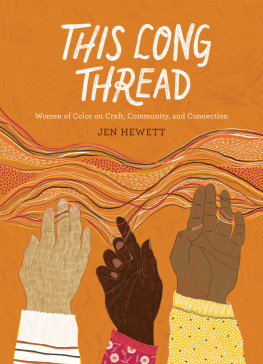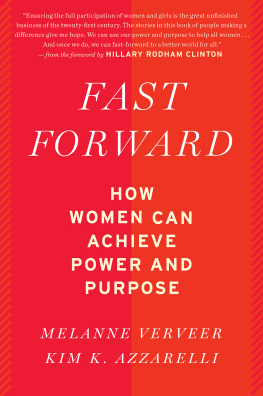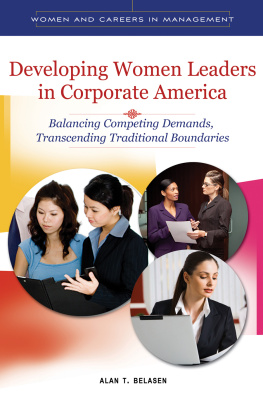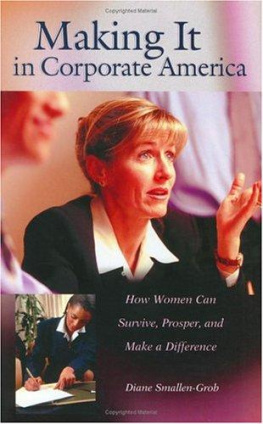Contents
Guide
For Ella, I hope you grow up in a world where you feel strongly you belong, as this is one of our most fundamental needs. I want you not to grow into the system around you, but instead to stand freely until you understand it and can use your power to determine where and how you want to root.
To the women of color who suffer in jobs and tasks outside the corporate system, your stories are important and your struggles often run deeper than the stories shared in this book.
To the women who are climbing in corporate now, power resides in each of you. Sometimes, you just need to be reminded it is there.
Contents
All of the stories in this book speak to real-life issues and circumstances faced by women of color in corporate spaces. Some contributors shared their stories and wanted to use their real names. Some shared their stories but wanted to mask their identities. In these cases, I have created pseudonyms and changed details of their stories that might identify them to protect their identities. Finally, some of the stories in this book are a composite based on a number of contributors sharing similar narratives. For the composite stories, any resemblance to any real person with similar names and/or circumstances is purely coincidental.
It was late September 2009, and I was sitting with my friend Walter from graduate school. We usually met in New York a few times a year to share our successes and our career hiccups. The bartender had just poured our champagne into two fluted glasses, and Walter raised his, saying, Congratulations to both of us. In the last six months, wed both made partner in our respective firms, him at his law firm, and me at a global professional services firm. It was an exciting time, full of possibility, and I was looking forward to celebrating and letting my shoulders down.
In many ways, Walter had been my biggest cheerleader. I often called him when I was stuck or wanted to celebrate big wins, and I always felt energized after our get-togethers. He seemed to always know what to say to perk me up and build my confidence. As we got to our second glasses and our meals came, he stopped me. I was far into a story, talking about the office politics I was navigating and the pressure I felt as a new partner, when he said, Deepa, seriously, you have nothing to worry about. You are set. You are golden. You are going to move so fast in the partnership. I stared at him, fork in midair, confused. What do you mean? I asked. He laughed and took a sip of champagne. You are a twofer. You have nothing to worry about. I on the other hand, as a white man, am going to have to work hard to earn what comes next. Youre going to skate ahead because you check so many boxes. Men like me, were losing opportunities, but people like you, you can ride this wave.
I could feel joy draining from my body. At the time, I didnt even know how to articulate what I was feeling. I finished my meal in record time, and I never met Walter with the same enthusiasm or sense of safety again. In just a few words, he had identified my knot of insecurities around whether I was good enough and whether others around me questioned my worth and my skills. In just a few words, he had uncovered the confusion I felt about being a woman of color (WOC) at work.
That incident is one of many similar situations I encountered in my time within the corporate world. It was common to feel high and then low in the same moment. Something amazing would happen and then in the blink of an eye someone would say something ignorant. Id feel the impulse to correct their words and their reality, while at the same time questioning my own.
Im not alone in my experiences. Like me, many women of color Ive met have scars from climbing the corporate ladder. We often question our reality. Did that really just happen? Do they realize what they just said? Oh, they werent expecting ME to show up! On top of that, we dont have enough friends we can turn to because so many of us are the first, part of the few, or the only: unique in the rooms we enter and in the places we stand as women of color at work.
The first, the few, the only is a phrase I use to describe women of color in the business world. Some of us are the first WOC in our families to go to college. We are sometimes the first to work outside the home or have a professional role. We are often one of the few women of color in our department or unit. And most of the time, we are the only woman of color in a senior leadership role in our company or organization.
As the first, few, and only, our path to Corporate America is almost always different from our white counterparts. Early in my career, I remember looking around and seeing maybe one Indian woman ahead of me. I made up my mind that if I didnt see it, I would be it. In fact, I literally typed you dont have to see it to be it and kept it in an email. When I doubted my abilities, I would read that email to reassure myself. But finding that inner confidence is not always easy. We have to be creative to find ways to remind ourselves we belong.
There is only one path I see to surviving it all, dealing with situations like the one I had with Walter, and thriving. As women of color, we need to unearth our individual power. It is not power that comes from outside accolades that folks like Walter have been providing; it is power that comes from inside of us.
It is power collected from our culture, from our lived experiences, and from the traits that each of us possess as WOC. It is power we define for ourselves. And it is unique to each of us. Once we find our individual and innate power, we can feed it by creating community, and building collective power to sustain us at work and in life. This is how we survive the structure of Corporate Americawhich was not built for us or by usand its how we change the systems around us.
A LIFETIME OF NOT BELONGING
I spent most of my life in white places and spaces. The town I grew up in, Whitehouse Station, literally had white in its name. Most of the kids in my classand, in fact, my whole schoolwere white. As a result, I spent my life questioning where I fit and where I belonged. My earliest memory of being different is of my mother, dressing me in Indian clothes, braiding my hair in plaits, as she called them, and then sending me to school with a bindi on my forehead. Im not sure I understood race and cultural differences back then. Instead, I internalized the pain and shame of being different, and tried even harder to fit in.
We never talked about race at home, yet it showed up everywhere, from which friends would invite us to their houses, to the racist remarks I heard at school, to dating boys who ultimately could not reconcile the color of my skin. It reached a breaking point late one night when I was living in London as a young graduate student. A drunk, white Englishman followed me from the tube to my flat late at night when there were few people around, making me fear for my safety as he called me the N-word and told me I was not welcome.
As the daughter of immigrants, I often felt even worse when we would visit India. I didnt fit in there, either, because I was seen as too Western. That confusion of not fitting in and adapting myself to navigate spaces followed me to work. All these experiences sank into my consciousness and stayed there, telling me: You dont fit in. You dont belong. As outsiders, especially if we dont grow up in communities of color, we spend most of our lives trying to fit in and feeling deep down we are different. I have spent my life living in competitive, high-performing, majority-white spaces, wondering why I was exhausted, confused, and drained of my power.

